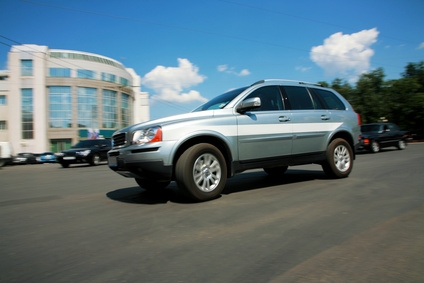
When a vehicle is driven around a corner, the side of the vehicle on the inside of the turn lifts as the weight is transferred towards the outside of the corner, a behavior generally referred to as body "sway," "roll" or "lean." This occurs to varying degrees depending on the make and model and the general mechanical condition of the vehicle. Excessive swaying from the rear end of a vehicle can be caused by a variety of issues, all of which can be remedied.
As the name implies a sway bar is a thin, tubular length of metal that goes from one side of the suspension to the other and controls sway when the vehicle is driven around corners. The bar acts a lever and pushes the inside tire towards the ground to reduce the amount of lean. The sway bar link is the small part that connect the bar itself to the vehicle's suspension. If the link is broken or damaged, the bar will not control the body roll of the vehicle in the manner in which it is intended to.
To see if the sway bar or link is damaged, raise the vehicle and check all of the mounting points of the bar, including the sway bar links as well as the middle brackets and bushings that fasten the vehicle to the car's chassis. If the link is broken or disconnected, a new link can be installed by unbolting the old link and installing a new one in the reverse of removal. Links cost anywhere from $20 to $50 (as of June 2010).
Worn-out shocks are among the significant causes of excessive sway in a vehicle and a feeling of looseness from the rear end. Over time, shocks lose their stiffness and ability to smoothly and quickly respond to weight transfer in corners. If shocks are worn out, the result is excessive body roll and a lack of control around corners. It is less common for springs to become worn, though this can be a consideration on vehicles with high miles.
To check the stiffness of your vehicle's rear shocks (or front shocks), push the corner of the car down as hard as possible. When the car rises back up, it should do so smoothly and quickly and come to a stop. It should not bounce up and down easily; if it does, then new shocks should be installed by a professional mechanic. A set of shocks generally starts at around $200 and goes up from there, depending on the brand and quality.
Sometimes excessive sway from a car's rear end can be caused by shocks that are too soft or sway bars that are too small. Often, these will be in perfect working condition but are just not heavy-duty enough to effectively control the movement of the vehicle's rear end. The solution is to install heavier duty shocks and larger sway bars to make the vehicle feel more planted and stable. It should be noted that a larger rear sway bar should never be installed without also installing a larger front sway bar.